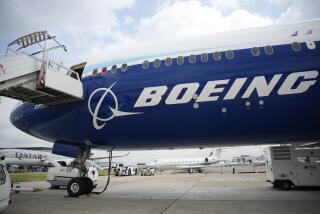Boeing Renames MD-95, Commits to Future Production
- Share via
Boeing Co. committed Thursday to continue the long-term production of the new MD-95 jetliner in Long Beach and renamed the aircraft the Boeing 717, conveying full-fledged Boeing status to the former Douglas Aircraft product.
As a result of throwing its marketing muscle and prestige behind the plane, Boeing said it has received new confirmed orders for the 100-seat jet, which is still in development. The Seattle-based company declined to identify the buyers or say how many new orders have been confirmed.
The 717 currently engages about 800 of the roughly 10,000 employees at the Doug
las facility. Employment will grow to about 1,200 as production begins next year.
The announcement appears to breathe new life into the Douglas unit, which has had a dearth of orders in recent years. In December, Boeing announced it would discontinue the MD-80 and MD-90 jetliner programs after existing orders are filled in about 1999.
“We feel this plane has tremendous potential,” Tom Schick, executive vice president of Boeing Commercial Airplane Group, said of the 717. “We feel the timing is right for this airplane.”
Boeing estimates that a market exists for 2,500 aircraft over the next 20 years in the 717’s short-range, 100-seat class, and so far it faces no immediate competition. Airbus Industrie is developing a competing jetliner but is several years behind Boeing, Schick said.
Boeing plans to produce 12 of the planes in 1999 and 40 in 2000. Schick said the Douglas plant could produce anywhere from two to 10 717s per month at a profit.
Even under optimistic production projections, however, it is unlikely the program will employ as many workers as the discontinued MD-80 and MD-90 programs, which have 3,500 people assigned to them.
Whether Boeing is forced to cut back the work force will depend on a number of variables over the next several years, including the possible transfer of new work to the plant.
Boeing had previously committed to producing only the first 50 of the 717s ordered by AirTran (formerly ValuJet) in 1995, prior to the merger of Boeing and McDonnell Douglas. Any additional production, Boeing said last year, was contingent on reducing production costs.
Boeing executives said they successfully hammered down those costs, but they declined to say by how much. McDonnell Douglas sold the first 50 aircraft for an average price of about $20 million each, though experts say the deal is probably a money loser.
On Thursday, Boeing said it is planning to reduce the 717’s official list price of $34 million in the near future, but it would not disclose by how much.
Boeing has said it will also continue long-term production in Long Beach of the MD-11, a wide-body trijet. The company does not plan to give the MD-11 a Boeing product designation, a spokesman said.
Jerry Callaghan, Boeing director and development program manager of the 717 in Long Beach, said he expects strong and growing demand for the aircraft.
The firm is examining how to make the 717 cockpit more like other Boeing models, he said. A key Boeing marketing strategy is to offer planes with nearly identical cockpit designs so that pilots require minimum training to switch among models. Douglas and Boeing planes both have the same Honeywell Inc. cockpit displays, so they are already somewhat similar.
Boeing officials said the 717 development is going smoothly, though they have experienced some parts shortages in hydraulic, mechanical and wiring systems.
More to Read
Inside the business of entertainment
The Wide Shot brings you news, analysis and insights on everything from streaming wars to production — and what it all means for the future.
You may occasionally receive promotional content from the Los Angeles Times.











